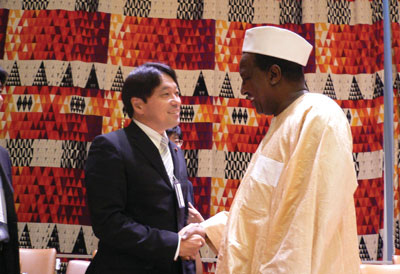
Senior Vice-Minister for Foreign Affairs Onodera (left) shaking hands with Mr. Konare (right), the Chairperson of the African Union Commission, at the high-level meeting on Darfur (September 21, New York, USA)
7. |
Africa |
(a) |
Africa in 2007 |
In Africa, there was progress toward peace and stability in 2007. Concrete examples of this include that in March the Wagadougou Agreement was reached in Côte d'Ivoire; the transition process toward civilian rule was completed in Mauritania; in July the dispatch to Darfur, western Sudan, of the African Union-United Nations Hybrid Operation in Darfur (UNAMID) was decided; and in August and September, the first presidential election since the withdrawal of UN peacekeeping operations was held peacefully in Sierra Leone. However, many challenges remained, such as escalating tensions between Ethiopia and Eritrea, the delay in the deployment of the African Union Mission to Somalia (AMISOM), ongoing instability in the Sudan, and the deterioration of the situation in the eastern region of the Democratic Republic of the Congo.
Africa is experiencing a favorable economic situation as a whole. Encouraging signs for economic development include dramatic economic growth in countries rich in natural resources such as oil and minerals and a high rate of economic growth in many other countries. Despite this, countries lacking stability in their internal affairs continue to have a low rate of economic growth, resulting in gaps appearing around the continent. Moreover, such overall growth trends do not necessarily lead to the alleviation of poverty or development, and in fact prospects for the achievement of the Millennium Development Goals (MDGs) appear bleak.
Support to Africa has become an important policy issue in the international community. In particular, there has been a marked appearance of emerging donors such as China and India, making the establishment of cooperative relations with these emerging donors a new issue requiring careful consideration.
(b) |
Japan's Diplomacy towards Africa |
Japan is undertaking proactive diplomacy towards Africa, with the Tokyo International Conference on African Development (TICAD) process, one of the largest policy fora on African development in the world, at the cornerstone of its engagement. Japan's African diplomacy seeks to achieve the three goals of (i) making proper contributions as a responsible member of the international community to the resolution of global issues that are concentrated in Africa; (ii) strengthening the foundations for Japan's diplomacy through enhanced relations with the countries of Africa, which comprise approximately 30% of the member states of the United Nations; and (iii) reinforcing Japan's economic relationship with Africa, which is blessed with resources and expected to become a large market for Japan in the future.
In particular, African development issues are expected to be addressed in 2008, with the convening of the fourth Tokyo International Conference on African Development (TICAD IV) as well as the G8 Hokkaido Toyako Summit in Japan. Japan is expected to play a leading role by orchestrating the diplomatic efforts of the G8 countries regarding these issues. Japan is currently advancing its preparations for the G8 Hokkaido Toyako Summit through discussions among the Africa Personal Representatives (APR) of the G8 heads of state as well as through preparations for the Africa Partnership Forum (APF).

Senior Vice-Minister for Foreign Affairs Onodera (left) shaking hands with Mr. Konare (right), the Chairperson of the African Union Commission, at the high-level meeting on Darfur (September 21, New York, USA) |